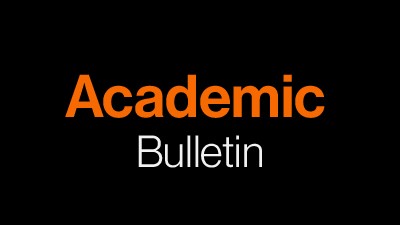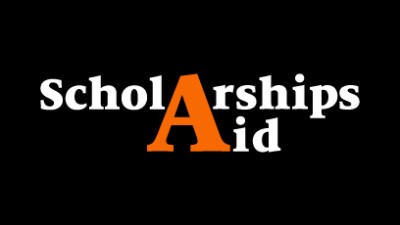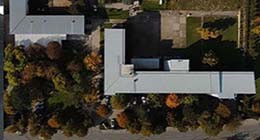Individualized Program
- RIT /
- RIT Kosovo /
- Academics /
- Individualized Program
Overview for Individualized Program
An American degree with innovation, adaptability and creative pathways that prepare students with professional and life skills for a global world.
The Rochester Institute of Technology, RIT Kosovo (A.U.K)’s degree granting partner, offers students the opportunity to create undergraduate programs from two or more professional areas of study with a strong foundation in the social sciences, through RIT’s innovative School of Individualized Study. In Kosovo, these professional areas of study are Management and Entrepreneurship, Economics and Statistics, Public Policy and Governance, Digital Arts and New Media Studies, Web and Mobile Computing (IT), Energy Policy Studies, Peace and Conflict Studies, and Security Studies.
Students can earn a two-year Associates Degree in Applied Arts and Sciences or a four-year Bachelor Degree in Individualized Program from the School of Individualized Study in Rochester, NY, U.S.A. In our degree programs, students work closely with faculty and professional advisers to design unique, multidisciplinary plans of study that combine several areas of academic knowledge and interests. The Individualized program is particularly appropriate for individuals who want to prepare themselves for a career that requires skills and expertise from several disciplines.
This blended learning environment provides a strong base for students in Kosovo, the region and around the world to learn and practice critical thinking, leadership and communications skills across disciplines while gaining the technical knowledge in the areas of professional study that best suit the individual. In addition to those professional sub-plans offered in Kosovo, students may elect to do a semester or year abroad at the Rochester campus or other global campuses to complete coursework not offered at this location. The School of Individualized Study is also a good choice for those who have unique ideas about how they want to design their academic areas of study, have prior college-level learning, or are interested in changing sub-plans.
Careers and Experiential Learning
Learning Outcomes
As a graduate of the Individualized Program the student will be able to:
- Communicate clearly and persuasively in writing, meeting both academic and professional expectations.
- Identify and thoughtfully analyze ethical dilemmas, applying ethical reasoning to decisions that impact individuals, groups, and society.
- Analyze and appreciate diverse forms of artistic expression, understanding their cultural and societal significance.
- View and analyze human experiences from diverse cultural perspectives, recognizing the interconnectedness of global societies.
- Analyze human behavior and understand how social systems and institutions shape our experiences.
- Understand scientific principles and apply scientific inquiry methods, both in theory and in hands-on environments.
- Perform college-level mathematical and statistical operations, interpreting quantitative data and understanding its application in the world.
- Gain a deeper understanding and advanced knowledge in a specific area, further developing their analytical and judgment skills, through immersion in a cluster of related courses.
- Choose elective courses that either support they degree program or broaden their knowledge in areas of personal or academic interest.
Skills Acquired by Student
Through this program, the student will acquire the following skills:
- Academic writing and effective communication
- Ethical reasoning and decision-making
- Critical analysis of art and cultural expressions
- Cultural awareness and global perspective
- Understanding of social systems and human behavior
- Scientific inquiry and problem-solving
- Application of scientific and mathematical principles
- Quantitative analysis and statistical interpretation
- Analytical thinking through focused immersive studies
- Adaptability and interdisciplinary learning
Competencies Developed
By completing the Individualized Program, the student will be competent in:
- Communicating effectively across written and verbal formats, adapting to academic and professional settings.
- Applying ethical reasoning to decision-making and understanding the impact of individual and group actions within society.
- Appreciating and critically engaging with artistic and cultural works, understanding their role in reflecting and shaping society.
- Demonstrating awareness of diverse cultures, recognizing global interconnections, and valuing different perspectives.
- Interpreting and analyzing social systems, institutions, and human behavior to understand societal dynamics.
- Applying scientific reasoning and inquiry methods to investigate natural phenomena and solve real-world problems.
- Using mathematical and statistical tools to solve problems, interpret data, and make informed decisions.
- Gaining deeper expertise in a specific area of interest through immersive studies, integrating knowledge across disciplines.
- Choosing elective courses that foster adaptability and a commitment to continuous learning across diverse fields.
BACHELOR OF SCIENCE COMPUTING AND INFORMATION TECHNOLOGIES
Learning Outcomes
As a graduate of the Computing and Information Technologies program the student will be able to:
- Analyze complex problems, clearly identify the necessary computing requirements, and outline solutions to address these challenges.
- Design, create, and evaluate effective computing solutions that meet specific requirements within the field.
- Communicate complex technical information clearly and effectively with a wide range of audiences.
- Be prepared to make sound decisions in my computing practice, grounded in both ethical standards and legal principles.
- Work effectively within a team to set objectives, plan and complete tasks, manage risks, and deliver results on time.
- Identify and analyze user needs to ensure that computing systems are chosen, integrated, evaluated, and managed effectively.
Skills Acquired by Student
Through this program, the student will acquire the following skills:
- Problem analysis and requirements gathering
- Solution design and coding
- Testing and evaluation of computing solutions
- Technical writing and presentation skills
- Ethical decision-making in it
- Teamwork and project management
- User-centered design and system administration
- Risk assessment and mitigation
- Communication with technical and non-technical audiences
- Integration of computer-based systems
Competencies Developed
By completing the Computing and Information Technologies program, the student will be competent in:
- Applying analytical and technical skills to break down complex computing challenges and devise practical solutions.
- Designing and deploying tailored, efficient computing solutions to meet real-world needs in various IT contexts.
- Delivering clear, concise, and audience-tailored explanations of technical concepts, enhancing collaboration and knowledge sharing.
- Recognizing ethical implications in computing practices and making responsible, legally-compliant decisions.
- Leading and contributing to team projects, ensuring goals are met through organized planning, risk management, and effective coordination.
- Evaluating and managing computer systems with a focus on user needs, ensuring usability, reliability, and satisfaction.
Curriculum for 2024-2025 for Individualized Program
Current Students: See Curriculum Requirements
Individualized Program, BS degree, typical course sequence
| Course Number & title | CR | |
|---|---|---|
| Year 1 | ||
| UWRT-150 |
General Education – First-Year Writing: Writing Seminar (WI)
|
3 |
| MATH 111 |
General Education – Mathematical Perspective A: Precalculus
|
3 |
|
General Education – Artistic Perspective
|
3 | |
|
General Education – Natural Science Inquiry Perspective
|
3 | |
|
General Education – Elective
|
3 | |
|
First Year Seminar – YOPS 10 RIT 365: Connections
|
0 | |
|
General Education – (WI)
|
3 | |
| MATH 171 |
General Education – Mathematical Perspective B:Calculus A
|
3 |
|
General Education – Ethical Perspective
|
3 | |
|
General Education – Scientific Principles Perspective
|
3 | |
|
General Education – Elective
|
3 | |
| SOIS-499 |
Co-op Applied Arts and Science
|
0 |
| Total |
30 |
|
| Year 2 | ||
| SOIS-325 |
Program Writing Intensive: Business Communication (WI-PR)
|
3 |
|
General Education – STAT 145 or SOIS 200 Introduction to Statistics I
|
3 | |
|
General Education – Global Perspective
|
3 | |
|
General Education – Elective
|
3 | |
|
General Education – Elective
|
3 | |
|
General Education – Social Perspective
|
3 | |
|
General Education - Elective
|
3 | |
|
General Education - Elective
|
3 | |
|
General Education – Immersion I
|
3 | |
|
Professional Core (A)
|
3 | |
| Total |
30 |
|
| Year 3 | ||
|
Professional Core (A)
|
3 | |
|
Professional Core (A)
|
3 | |
|
Professional Core (B)
|
3 | |
|
Professional Core (B)
|
3 | |
|
General Education – Immersion II
|
3 | |
|
Professional Core (A)
|
3 | |
|
Professional Core (A)
|
3 | |
|
Professional Core (B)
|
3 | |
|
General Education – Immersion III
|
3 | |
|
Open elective
|
3 | |
| SOIS 499 |
Co-op Applied Arts and Science
|
0 |
| Total |
30 |
|
| Year 4 | ||
|
Professional Core (A)
|
3 | |
|
Professional Core (A)
|
3 | |
|
Professional Core (B)
|
3 | |
|
Professional Core (B)
|
3 | |
|
Open Elective
|
3 | |
|
Professional Core (A)
|
3 | |
|
Professional Core (B)
|
3 | |
|
Professional Core (B)
|
3 | |
| SOIS-500 |
Senior Capstone or SOIS 510 Multidisciplinary Life
|
3 |
|
Open Elective
|
3 | |
| Total |
30 |
|
Please see course catalog form more information on courses.
(WI) refers to a writing intensive course within the major.
Select a Sub-Plan
|
Economics & Statistics
|
|||||||||||||||||||||||||||||||||||||||||||||||||||||||||||||||||||||||||||||||||||||||||
The Economics and Statistics subplan emphasizes the quantitative analytical approach to dealing with economic problems in both the public and private sectors, providing students with marketable skills and the intellectual foundation for career growth. Graduates are prepared for entry-level managerial and analytical positions in both industry and government and to pursue graduate studies in economics, business, and law. The economics curriculum develops communication, computational, and management skills in addition to economic reasoning and quantitative abilities. The program's required courses develop student's abilities to apply economic analysis to real-world problems. Liberal arts courses enhance oral and written communication skills. Business courses include accounting and finance. Quantitative analytical skills are developed by a course sequence that includes computer science, mathematics, and statistics. TOTAL CREDITS 24
| |||||||||||||||||||||||||||||||||||||||||||||||||||||||||||||||||||||||||||||||||||||||||
|
Energy Policy Studies
|
|||||||||||||||||||||||||||||||||||||||||||||||||||||||||||||||||||||||||||||||||||||||||
Energy Policy Studies offers students the opportunity to enhance their knowledge in energy, environment, and natural resource management. Courses in the Energy Policy Studies concentration will offer a thorough understanding of the energy industry fundamentals; structure and operation of international energy systems; energy policy markets, regulations, policies, strategies, technologies; and social elements involved in delivering energy solutions in Kosovo, the region and the world. Courses are intended for students interested in to pursue their careers in energy sector (private and public), development, social responsibility, and natural resource management. The designated courses have been strategically selected to complement other professional concentrations. Students will be exposed to ideas and concepts wide-ranging and uniformly balanced among traditional and emerging energy alternatives in an academically challenging and innovative solution-focused setting. TOTAL CREDITS 24
| |||||||||||||||||||||||||||||||||||||||||||||||||||||||||||||||||||||||||||||||||||||||||
|
Digital Arts and New Media Studies
|
|||||||||||||||||||||||||||||||||||||||||||||||||||||||||||||||||||||||||||||||||||||||||
Digital Arts and New Media Studies combines contemporary visual communication and multimedia theory and tools to prepare students for effective communications across a wide variety of media. The course sequencing prepares students with practical and theoretical aspects of graphic design, web development, print design and multimedia production, communication techniques and digital asset management. A student completing the Digital Arts and New Media Studies sub-plan is prepared with the theoretical framework and hands-on technical skills needed to organize, design and communicate ideas and information in the 21st century global market and to meet the projected national market needs in the greater Kosovo region. It is also an excellent compendium to RIT Kosovo (A.U.K)'s other sub-plan offerings and provides a useful skill set for private and family business operations. The student should either take ISTE-240 or ISTE-260. TOTAL CREDITS 24
| |||||||||||||||||||||||||||||||||||||||||||||||||||||||||||||||||||||||||||||||||||||||||
|
Management & Entrepreneurship
|
|||||||||||||||||||||||||||||||||||||||||||||||||||||||||||||||||||||||||||||||||||||||||
The Management & Entrepreneurship subplan prepares students for management and specialist careers in a variety of enterprises and organizations. Students develop the skills and concepts needed to become effective leaders, ethical decision makers, and creative innovators. The management curriculum provides both depth and flexibility in its offerings so that students may maximize their educational experience. TOTAL CREDITS 24
| |||||||||||||||||||||||||||||||||||||||||||||||||||||||||||||||||||||||||||||||||||||||||
|
Peace & Conflict Studies
|
|||||||||||||||||||||||||||||||||||||||||||||||||||||||||||||||||||||||||||||||||||||||||
Peace and Conflict Studies gives students the tools to analyze the socio-economic, psychological and political dynamics of violent conflict and its transformation. Students will study conflict dynamics and group polarizations. They will analyze the genesis and transformation of violent conflicts, as well as post-conflict challenges in state-building, social integration and development. Students will explore identity conflicts, resource conflicts and genocides. Students will study the relationships between individual and group identity and labelling, the economic bases of conflict transformation, ethical issues underlying decisions of international actors to intervene or not intervene in conflicts, and practical steps towards good governance at the end of armed conflict. The teaching faculty includes academics from political science, psychology, sociology, anthropology and economics, as well as policy makers with direct experience in crises and peace building in the Balkans, the Middle East, Africa and Asia. TOTAL CREDITS 24
| |||||||||||||||||||||||||||||||||||||||||||||||||||||||||||||||||||||||||||||||||||||||||
|
Public Policy & Governance
|
|||||||||||||||||||||||||||||||||||||||||||||||||||||||||||||||||||||||||||||||||||||||||
The Public Policy & Governance subplan provides students with a clear understanding of public policy, the policy process, and policy analysis. Students are introduced to the concept of public policy, the policy making process, and methodologies associated with policy analysis. The roles of stakeholders and interest groups are discussed in the context of contemporary cases in various policy arenas. TOTAL CREDITS 24
| |||||||||||||||||||||||||||||||||||||||||||||||||||||||||||||||||||||||||||||||||||||||||
|
Security Studies
|
|||||||||||||||||||||||||||||||||||||||||||||||||||||||||||||||||||||||||||||||||||||||||
Security Studies provides students the opportunity to learn about military officer training and its mission to develop leaders for tomorrow’s Armed Forces. Courses promote leadership and management, skills that can be employed in any career field, along with courses analyzing the military’s role in national security affairs and foreign policy. TOTAL CREDITS 24
| |||||||||||||||||||||||||||||||||||||||||||||||||||||||||||||||||||||||||||||||||||||||||
|
Web & Mobile Computing (IT)
|
|||||||||||||||||||||||||||||||||||||||||||||||||||||||||||||||||||||||||||||||||||||||||
The Web & Mobile Computing (IT) subplan emphasizes the basics of both applied informatics and web development. The web has become the ubiquitous communication medium. Therefore, knowledge of how the web works and how to effectively develop dynamic websites has value to students enrolled in many subplan areas and with different career goals. Upon completing this subplan, students will have the broad range of skills and understanding necessary to design and build a basic, but complete, web presence in their selected area of interest. Students will also gain an understanding of how to use multimedia and create systems that allow the subject matter expert to leverage available information. The courses in this subplan are applied and focus on hands-on learning, including projects that will be beneficial outside of the university setting. TOTAL CREDITS 24
| |||||||||||||||||||||||||||||||||||||||||||||||||||||||||||||||||||||||||||||||||||||||||
|
Individualized Studies
|
|||||||||||||||||||||||||||||||||||||||||||||||||||||||||||||||||||||||||||||||||||||||||
The Individualized Study sub-plan aims to accommodate the needs of modern day students and/or the working adult. This flexible, individualized program of professional study gives the students the opportunity to combine up to four sub-plans for their degree. Each sub-plan constitutes of coherent sets of discipline related courses and appropriate electives for the professional component, in addition to the core of mathematics, science, humanities, and social sciences component of the degree. | |||||||||||||||||||||||||||||||||||||||||||||||||||||||||||||||||||||||||||||||||||||||||
Contact
Office of Admissions
Phone: + 383 38 66 00 00
E-mail: admissions@auk.org









